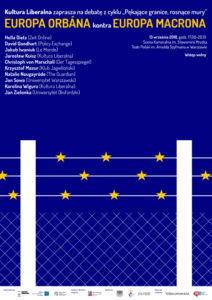
National Endowment for Democracy
One thing is especially disconcerting about the illiberal turn in Eastern and Central Europe. It has been the early front-runners of democratization – Hungary and Poland – where democratic backsliding has gone farthest and fastest, note analysts Seán Hanley and James Dawson:
Much of the growing literature on ECE backsliding has focused on the actions of illiberal entrepreneurs in Hungary and Poland’s national-conservative governments and asked if and how EU institutions can respond through procedures like the Union’s Article 7 rule-of-law mechanism (now invoked against both Warsaw and Budapest).
 However, there has been limited reflection on why expectations of ECE democratisation have proved so wrong. The dominant line of argument has been that existing analyses were right in theory – correctly picking out key factors driving or obstructing democratisation – but, unfortunately, wrong in practice: EU democratic leverage, for example, now appears to many, on second glance, to have been too weak, too short-lived or too patchy to lock in democracy.
However, there has been limited reflection on why expectations of ECE democratisation have proved so wrong. The dominant line of argument has been that existing analyses were right in theory – correctly picking out key factors driving or obstructing democratisation – but, unfortunately, wrong in practice: EU democratic leverage, for example, now appears to many, on second glance, to have been too weak, too short-lived or too patchy to lock in democracy.
We find this unconvincing. In our recently published article, we call for a more fundamental rethink of the reasons scholars misread ECE democratisation – and for a broadening of attention beyond troubling authoritarian dynamics visible in Hungary and Poland to include ECE member states where backsliding is less overt, they write for the Journal of Common Market Studies (JCMS). RTWT







